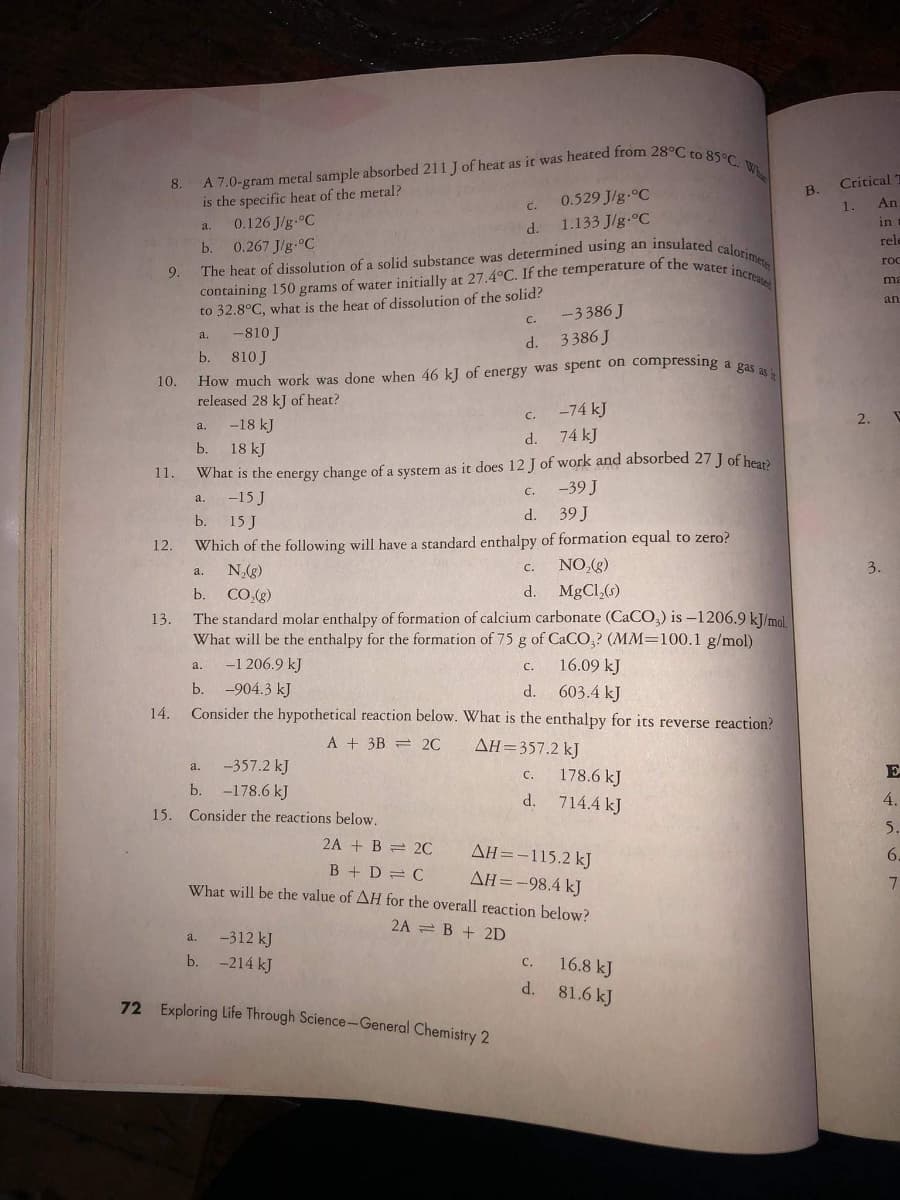containing 150 grams of water initially at 27.4°C. If the temperature of the water increae The heat of dissolution of a solid substance was dete orimete D. гос 9. ma to 32.8°C, what is the heat of dissolution of the solid? C. an -3386 J d. 3386 J -810 J a. b. 810 J compressing How much work was done when 46 kJ of energy was spent on released 28 kJ of heat? a gas as 10. -74 kJ с. 2. a. -18 kJ d. 74 kJ b. 18 kJ 11. What is the energy change of a system as it does 12 J of work and absorbed 27 J of hew -39 J с. a. -15 J b. 15 J d. 39 J 12. Which of the following will have a standard enthalpy of formation equal to zero? NO,(g) 3. N,(g) b. CO,(g) The standard molar enthalpy of formation of calcium carbonate (CACO,) is -1206.9 kl/mol C. a. d. MgCl,(s) 13.
containing 150 grams of water initially at 27.4°C. If the temperature of the water increae The heat of dissolution of a solid substance was dete orimete D. гос 9. ma to 32.8°C, what is the heat of dissolution of the solid? C. an -3386 J d. 3386 J -810 J a. b. 810 J compressing How much work was done when 46 kJ of energy was spent on released 28 kJ of heat? a gas as 10. -74 kJ с. 2. a. -18 kJ d. 74 kJ b. 18 kJ 11. What is the energy change of a system as it does 12 J of work and absorbed 27 J of hew -39 J с. a. -15 J b. 15 J d. 39 J 12. Which of the following will have a standard enthalpy of formation equal to zero? NO,(g) 3. N,(g) b. CO,(g) The standard molar enthalpy of formation of calcium carbonate (CACO,) is -1206.9 kl/mol C. a. d. MgCl,(s) 13.
Chemistry: Principles and Reactions
8th Edition
ISBN:9781305079373
Author:William L. Masterton, Cecile N. Hurley
Publisher:William L. Masterton, Cecile N. Hurley
Chapter8: Thermochemistry
Section: Chapter Questions
Problem 31QAP: A student is asked to calculate the amount of heat involved in changing 10.0 g of liquid bromine at...
Related questions
Question
10 11 12

Transcribed Image Text:A 7.0-gram metal sample absorbed 211 J of heat as it was heated from 28°C to 85°C. Wh
containing 150 grams of water initially at 27.4°C. If the temperature of the water increase
The heat of dissolution of a solid substance was determined using an insulated calorimete
8.
Critical
is the specific heat of the metal?
0.126 J/g-°C
0.529 J/g.°C
1.133 J/g.°C
B.
C.
1.
An
a.
d.
in
rele
b. 0.267 J/g-°C
roc
9.
ma
to 32.8°C, what is the heat of dissolution of the solid?
C.
an
-3 386 J
-810 J
a.
d. 3386 J
b.
810 J
How much work was done when 46 kJ of energy was spent on compressing a gas
released 28 kJ of heat?
10.
-74 kJ
C.
2.
-18 kJ
a.
d.
74 kJ
b.
18 kJ
11.
What is the energy change of a system as it does 12 J of work and absorbed 27 J of hear
C.
-39 J
a.
-15 J
d.
39 J
b.
15 J
12.
Which of the following will have a standard enthalpy of formation equal to zero?
NO,(g)
3.
N(g)
b. СО)
с.
a.
d.
MgCl,(s)
The standard molar enthalpy of formation of calcium carbonate (CACO,) is –1206.9 kJ/mol
What will be the enthalpy for the formation of 75 g of CACO,? (MM=100.1 g/mol)
13.
-1 206.9 kJ
-904.3 kJ
Consider the hypothetical reaction below. What is the enthalpy for its reverse reaction?
16.09 kJ
603.4 kJ
a.
C.
b.
d.
14.
A + 3B = 2C
AH=357.2 kJ
-357.2 kJ
a.
178.6 kJ
E
C.
b.
-178.6 kJ
d.
714.4 kJ
4.
15. Consider the reactions below.
5.
2A + B = 2C
AH=-115.2 kJ
6.
B + D = C
What will be the value of AH for the overall reaction below?
AH=-98.4 kJ
2A = B + 2D
-312 kJ
a.
b.
-214 kJ
16.8 kJ
d. 81.6 kJ
с.
72 Exploring Life Through Science-General Chemistry 2
Expert Solution
This question has been solved!
Explore an expertly crafted, step-by-step solution for a thorough understanding of key concepts.
This is a popular solution!
Trending now
This is a popular solution!
Step by step
Solved in 2 steps with 2 images

Knowledge Booster
Learn more about
Need a deep-dive on the concept behind this application? Look no further. Learn more about this topic, chemistry and related others by exploring similar questions and additional content below.Recommended textbooks for you

Chemistry: Principles and Reactions
Chemistry
ISBN:
9781305079373
Author:
William L. Masterton, Cecile N. Hurley
Publisher:
Cengage Learning

Introductory Chemistry: A Foundation
Chemistry
ISBN:
9781337399425
Author:
Steven S. Zumdahl, Donald J. DeCoste
Publisher:
Cengage Learning

Chemistry: Principles and Practice
Chemistry
ISBN:
9780534420123
Author:
Daniel L. Reger, Scott R. Goode, David W. Ball, Edward Mercer
Publisher:
Cengage Learning

Chemistry: Principles and Reactions
Chemistry
ISBN:
9781305079373
Author:
William L. Masterton, Cecile N. Hurley
Publisher:
Cengage Learning

Introductory Chemistry: A Foundation
Chemistry
ISBN:
9781337399425
Author:
Steven S. Zumdahl, Donald J. DeCoste
Publisher:
Cengage Learning

Chemistry: Principles and Practice
Chemistry
ISBN:
9780534420123
Author:
Daniel L. Reger, Scott R. Goode, David W. Ball, Edward Mercer
Publisher:
Cengage Learning

Chemistry by OpenStax (2015-05-04)
Chemistry
ISBN:
9781938168390
Author:
Klaus Theopold, Richard H Langley, Paul Flowers, William R. Robinson, Mark Blaser
Publisher:
OpenStax

Chemistry for Engineering Students
Chemistry
ISBN:
9781337398909
Author:
Lawrence S. Brown, Tom Holme
Publisher:
Cengage Learning

General Chemistry - Standalone book (MindTap Cour…
Chemistry
ISBN:
9781305580343
Author:
Steven D. Gammon, Ebbing, Darrell Ebbing, Steven D., Darrell; Gammon, Darrell Ebbing; Steven D. Gammon, Darrell D.; Gammon, Ebbing; Steven D. Gammon; Darrell
Publisher:
Cengage Learning